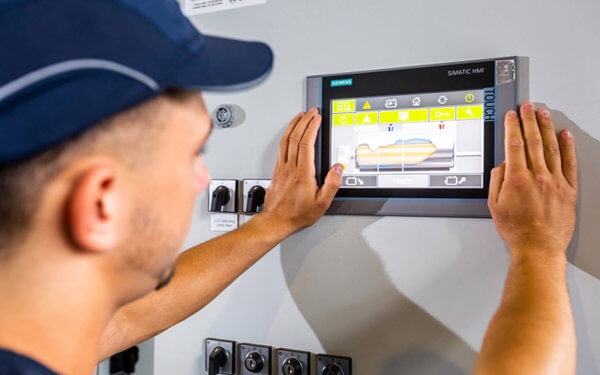Do you know what to look for in the ideal decarbonisation partner?
Learn how to prepare your organisation for an end-to-end net zero partnership – and what to look for in the ideal strategic relationship.
The business case for decarbonisation is clear. Improved energy efficiency and resilience, better brand reputations and simplified compliance are among the many reasons organisations are exploring their options.
And as we unpacked in our recent discussion with Alex Payne, Head of Energy Advisory at Mitie, the cost of inaction can be devastating. But that doesn’t mean you have to do everything all at once. Or, just as importantly, alone.
Wherever you are on your decarbonisation journey, it’s never too early to find a trusted strategic partner to help you navigate the road to net zero. But how can you make sure you get the most from that partner? What pitfalls do you need to avoid? And what does the ideal end-to-end partner look like?
To help answer these questions, we spoke to Alex Avila, Head of Decarbonisation Consulting at Mitie.
Start early – and prioritise an end-to-end approach
There are two distinct partner approaches that you can take to net zero. The first means trusting a single partner to handle your entire decarbonisation strategy, including end-to-end solution design, implementation and management.
The second approach is less systematic in that individual decarbonisation specialists are used for their own particular area of focus. For example, you may choose a solar specialist provider to deploy solar PV across your estate and then a different specialist to install ground source heat pumps at specific sites.

Naturally there are pros and cons to both approaches.
“An end-to-end partner lets you focus on your core business,” says Alex. “While you can guide them to ensure they deliver against your strategic goals, it’s their responsibility to manage any distracting ancillary tasks for you – including asset delivery, maintenance and energy tracking and optimisation.”
Alex notes that, while allocating a single partner to handle all aspects of decarbonisation is a valid option, it can be a hard sell at an executive level.
“You will have an easier time convincing executive leaders if you focus on quick wins, and scale up from there,” he says. “Look at improving areas that will deliver immediate cost and carbon reductions without requiring significant investment or disruption.”
To get this right, you will need a partner that you can trust. And one that can support you end-to-end, however you choose to tackle decarbonisation – holistically, or one project at a time.
But before you can go to tender, you must get your priorities in order.
Know what you want from a net zero partner
If there’s one piece of advice that rings true for all net zero projects, it’s that you must know exactly where you want to get to, why it matters to your organisation and what your priorities are – as well as how they align to your broader strategic objectives.
“Your objective may be net zero, but before you start your journey, you need to scope out exactly what you need,” says Alex. “This means recognising the challenges of each department in your organisation and the industry at large. This makes it easier to align your strategy to corporate objectives and to clarify exactly what you need from a partner.”
For example, if you plan on transitioning your operational fleet to electric vehicles, you must ensure the solution won’t disrupt operational continuity, including employees and supply chain partners – or even breach wider industry regulations.
Once you’ve made the appropriate strategic preparations, you can start looking for the ideal end-to-end partner. Here’s how.
Find a strategic partner with a proven track record
Remember, you’re not looking for a transactional contractor to come in, do some work and leave – you’re looking for a trusted strategic advisor. And the best strategic partners will:
- Understand your carbon baseline, objectives and strategic goals
- Use data to generate insights and inform decision making
- Monitor and track performance to ensure consistent progress
“Your partner should be data-driven and acutely aware of increasingly strict energy and carbon reporting regulations,” says Alex. “Very soon, you will need to report your ESG data much like your annual finances, and ideally, your partner will enable you to provide accurate net zero measurements over time.”
What’s more, your chosen partner must be equipped to navigate the increasingly complex and vast amount of data required to create actionable insights. This includes capturing asset data, building portfolio data and net zero data to define and inform strategic decision making.

Alex also warns that businesses can no longer afford to ignore supply chain data related to Scope 3 emissions, even if you have less control over them. “It may not be the top of your agenda right now, but as new regulations come in, you’ll need to report this data and use it to amend your long-term strategy,” he says.
To validate your partner’s overall value proposition, do your due diligence and assess whether they have the following:
- A track record delivering decarbonisation solutions for similar organisations
- A proven understanding and application of collaborative problem solving
- A complete, end-to-end approach to decarbonisation support and outcomes
“Some organisations back themselves into a corner by choosing the first partner to come along, and when it goes wrong, they can’t leave,” says Alex. “Instead, ensure you can end the relationship if the partner isn’t delivering as promised, and measure that with KPIs.”
Your end-to-end decarbonisation experts
Mitie works with organisations across the UK, designing, building and managing the bespoke decarbonisation solutions needed to reach net zero. That includes the software and hardware required to monitor, optimise and adapt to shifting energy trends and demands.
Decarbonisation needn’t distract you from your core business or driving growth. Discover the five biggest challenges to net zero, and learn more about how Mitie can help you meet your critical strategic goals.
Let's get started
If you’re looking for more information, need to talk to someone about an enquiry or want to chat about your service needs, then you’ve come to the right place.
Please fill in our short form and a member of our team will be in touch.
If you have a supplier enquiry, please visit our dedicated portal on www.mitiesuppliers.com